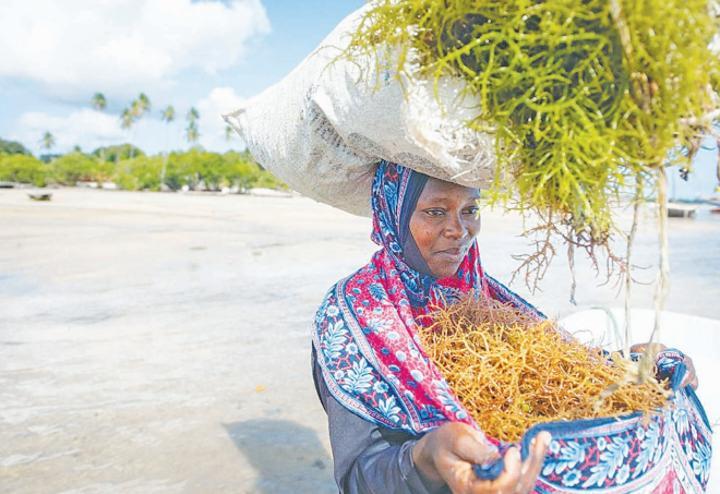Africa-Press – Tanzania. ON the serene coasts of Pemba and Tanga, a quiet revolution is unfolding, one tide at a time. Once vulnerable to dwindling fish stocks, poverty and environmental degradation, these Tanzanian coastal communities are now charting a new course toward sustainability, prosperity and ecological resilience.
At the heart of this transformation is the Mwambao Coastal Community Network, a grassroots organisation established in 2010 to empower local communities in managing their marine resources through participatory governance.
Today, with the support of key funders such as the Blue Action Fund (BAF) and the East African Crude Oil Pipeline (EACOP) project, Mwambao is spearheading initiatives that are not only restoring marine ecosystems but also uplifting livelihoods.
One of Mwambao’s most innovative efforts is the MKUBA eco-credit programme, recently launched in four communities on Pemba Island, Mtambwe Kusini, Kisiwani, Kangani and Michezani.
This initiative links community-based savings and loan groups to conservation outcomes, creating financial incentives for sustainable marine practices.
“In Tanga’s Mchomapundu area, five other communities have adopted similar models,” explained Abubakar Othman, Mwambao’s Programmes Officer.“By tying financial access to conservation-friendly economic activities, we’re helping communities build resilience while protecting the ocean.”
The core aim of the programme is to align conservation with improved livelihoods. Mwambao’s team has identified several marine and coastal products with strong income-generating potential, including tuna, sardines (dagaa), octopus, seaweed, reef fish, honey and beeswax.
“These products were chosen based on their market demand, ecological sustainability, recovery rates and scalability,” said Othman.
Among them, seaweed stands out as the most sustainable and market-viable. It ranks highest in the Product Sustainability Diagnostic (PSD), thanks to its low environmental impact and growing demand in both local and international markets. Octopus and sardines, with their fast regeneration cycles, also offer great promise for community-led management.
Post-harvest losses, especially for sardines, currently exceed 40 per cent, posing a major challenge to fishers and processors. To address this, Mwambao is promoting solar drying and improved processing techniques that preserve quality, reduce waste and increase profits.
Beyond fish, the programme is also exploring the cosmetic and pharmaceutical value of beeswax and honey, creating new revenue streams for families that traditionally relied solely on fishing.
In keeping with its inclusive approach, Mwambao recently conducted two Participatory Market System Development (PMSD) workshops in Pemba and Tanga to assess the value chains of tuna and anchovies.
These sessions, followed by validation meetings with 135 participants, 68 women and 57 men, provided valuable insights into market bottlenecks and opportunities.
“Solutions came from the community members themselves,” said Othman. “This bottom-up process increases ownership and long-term sustainability of interventions.”
Mwambao’s model also promotes the creation of temporary fishing closures and encourages sustainable harvesting practices, which allow fish populations to recover while giving communities a tangible stake in resource conservation.
“As Nathan Bennett of IUCN points out, social equity isn’t just a buzzword, it’s central to effective marine conservation,” Othman emphasised.
He says by integrating conservation with commerce, we’re building sustainable coastal economies that serve both people and the planet.
A report by the Marine Biodiversity Science Centre supports this claim, noting that community-managed areas demonstrate higher biodiversity, better resource sustainability and stronger social cohesion.
Mwambao’s work in Pemba and Tanga provides a scalable model for conservation-led development, blending local governance, traditional knowledge, economic innovation and climate-smart practices.
What’s happening in these Tanzanian coastal zones echoes global priorities: Equitable governance, environmental restoration and inclusive growth.
And while the ecological impacts are impressive, the stories of individual transformation are even more powerful.
Juma Said, a fisherman from Kukuu Village in Pemba, recalls a time when conflict over fishing zones was common and catches were dwindling.
“Now, we have a community fishery plan and no-take zones. The fish are back,” he said proudly. “I’ve been trained to use sustainable gear. I can finally bring home enough to feed my family and still earn an income.”
Asha Bakari, a seaweed farmer on the Tanga coast, credits her newfound independence to Mwambao’s training programmes.
“I joined a women’s group and learned better farming and drying methods. Now I can package and sell seaweed. The income helps pay my children’s school fees. I never imagined the ocean could empower me like this.”
Omari Suleiman, an elder from Kwale Island, reflected on how perceptions around mangrove conservation have changed dramatically.
“Before, people cut mangroves without a second thought. But Mwambao taught us how important they are for fish breeding and shoreline protection. Now, we’ve created bylaws and young people lead patrols. The crabs and fish have returned. It’s not just about income, it’s about pride in our community.”
Mariam Yusuf, a member of the MKUBA savings group in Mchomapundu, used her loan to start a fish-drying business.
“We also learned about reef conservation and climate change,” she said. “For women like me, it’s empowering, we protect the sea and improve our lives at the same time.”
What’s striking about Mwambao’s model is its holistic nature. It recognises that marine conservation cannot be separated from livelihoods, social equity, or local leadership. By giving communities the tools, training and trust to lead their own development, it builds a foundation that is not only environmentally sustainable, but also socially just.
Mwambao’s work illustrates that community-based conservation is not a compromise, it’s a catalyst. It brings together science, policy and lived experience to create adaptive solutions that respond to local realities while contributing to global conservation goals.
As climate change continues to threaten coastal ecosystems and livelihoods around the world, the success of Mwambao in Tanzania offers a compelling blueprint. It proves that empowering local people to be stewards of their environment is not only ethically sound, it is also incredibly effective.
For More News And Analysis About Tanzania Follow Africa-Press







